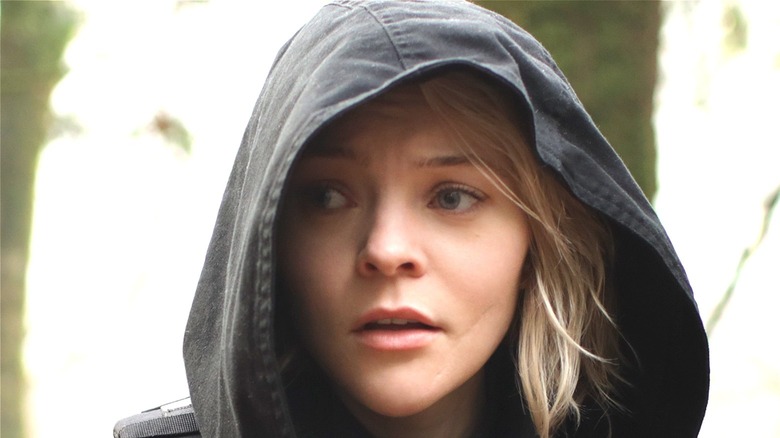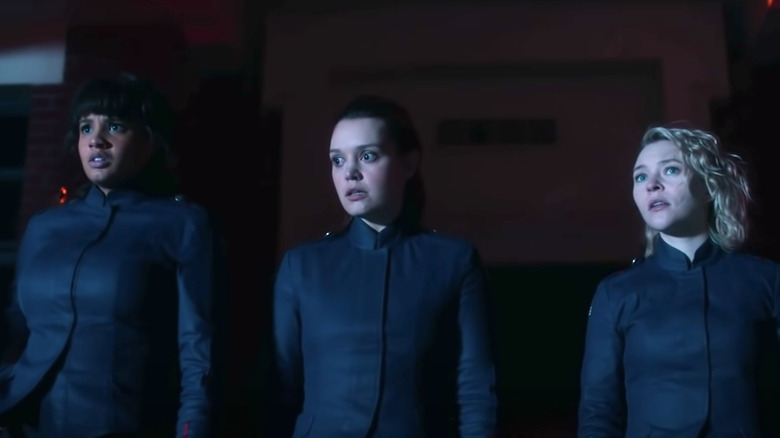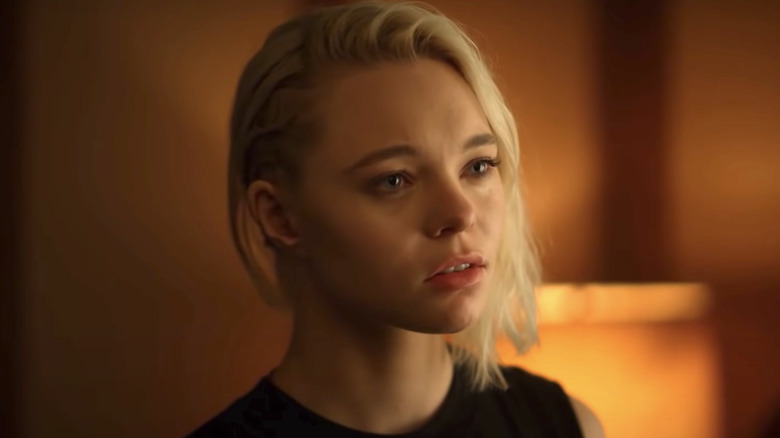What Motherland: Fort Salem Gets Wrong About Witches
Freeform's "Motherland: Fort Salem" is far from the first show to revolve around witchcraft — but it does have one of the most unique premises in the genre of fantasy television. Unlike the title character in Netflix's "Chilling Adventures of Sabrina" or the three sisters in "Charmed," the witches in "Motherland: Fort Salem" aren't forced to conceal their supernatural abilities from the general public or choose between their witch and human identities — in fact, their powers form the entire basis of U.S. national security.
In the alternate universe of "Motherland: Fort Salem," witches are accepted members of society on the condition that they agree to be drafted into lifelong military service as soon as they turn 18. The show follows a present-day trio of young witches, Raelle Collar (Taylor Hickson), Abigail Bellweather (Ashley Nicole Williams), and Tally Craven (Jessica Sutton), as they navigate basic training in preparation for their admission to War College. A looming threat is the Spree, a mysterious militant witch organization that rebels against forced army conscription and carries out terrorist attacks on the human population throughout the U.S.
Created by Eliot Laurence, the show is notable for its extensively mapped mythology and innovative approach to witchcraft. In fact, the show has another name for witchcraft entirely. "Eliot's just taking it to that next fantasy level," said Sutton in an interview with Den of Geek. "He doesn't even call magic, magic. He calls it work." But how closely does the "work" in "Motherland: Fort Salem" resemble the craft practiced by actual witches? Let's explore some of the other key differences between the history and practice of real-life witchcraft vs. the way it's portrayed in "Motherland: Fort Salem."
The show provides an alternate history of the Salem witch trials
"Motherland: Fort Salem" is based on the fictional premise that the people accused of witchcraft during the Salem witch trials not only survive, but are, in fact, real witches. The show is set in an alternate history of the United States in which the Salem witches, led by current General Sarah Alder (Lyne Renée), avoid execution and oppression by cutting a deal with the military in a fictional truce known as the Salem Accords.
In reality, 19 of the 30 people convicted of witchcraft in Salem, Massachusetts were executed after the trials, which took place between 1692 and 1693 (via Newsweek). 200 people were accused of witchcraft after two young girls blamed a series of mysterious "fits" from the "devil's magic" on three women — Sarah Good, Sarah Osbourne and Tituba, all of whom were arrested. The trials followed on the heels of a wave of "witch hunts," mostly targeting women, that swept through Europe between the 1300s and 1600s (via Smithsonian Magazine). Massachusetts did not issue a formal apology for the Salem witch trials until 1957, 250 years after the events took place.
Through the alternate history, the Freeform show majorly diverges from the real history of witch trials, as well as the development of witchcraft as a practice in real-life society.
In Motherland: Fort Salem, witchcraft is biological
In an interview with Assignment X, Eliot explained the creative process behind developing the idea for "Motherland: Fort Salem," saying, "I wanted to really create a storyline that raised the question of, 'What is a witch?'" In the universe of "Motherland: Fort Salem," witches are seen as almost a separate species and inherit their powers genetically. They are even physiologically different from humans, possessing an extra set of vocal cords that enable them to sing at pitches (known as "seed sounds") that harness and manipulate the power of the earth (via Fandom). Overall, the witches on the show don't really have a belief system or historical traditions in the way that actual belief systems, including witchcraft, do in real life. It is unclear if the work in "Motherland" is tied to any specific religious tradition, though the witches celebrate the real Pagan holiday of Beltane, and Raelle invokes Bible verses to cast spells.
In reality, witchcraft is most commonly associated with various Pagan religions, such as Wicca, which has its roots in pre-Christian spiritual practices (via BBC). In a Reddit thread posted to r/MotherlandFortSalem, Reddit user u/briefsboyzkik suggested that "Motherland: Fort Salem" would be improved by paying homage to the diversity of witchcraft as practiced by many cultural traditions: "After seeing Raelle's Christi pagan work it got me thinking what [if] other witches use work based around voodoo or Druidism it [would] be cool to see as it [would] be expanding the cultural aspect of the show." U/MyXomatos1s agreed, suggesting, "Maybe African beliefs and rituals? A lot of what we know as voodoo, santeria etc has roots with African rituals. That could also lean into eastern mysticism, which we already see with Khalida."
While "Motherland: Fort Salem" touches on the ideas and practices of Wicca, Pagan, and other real belief systems, fans hope that the series embraces and explores real witchcraft traditions and history in its upcoming third season.


